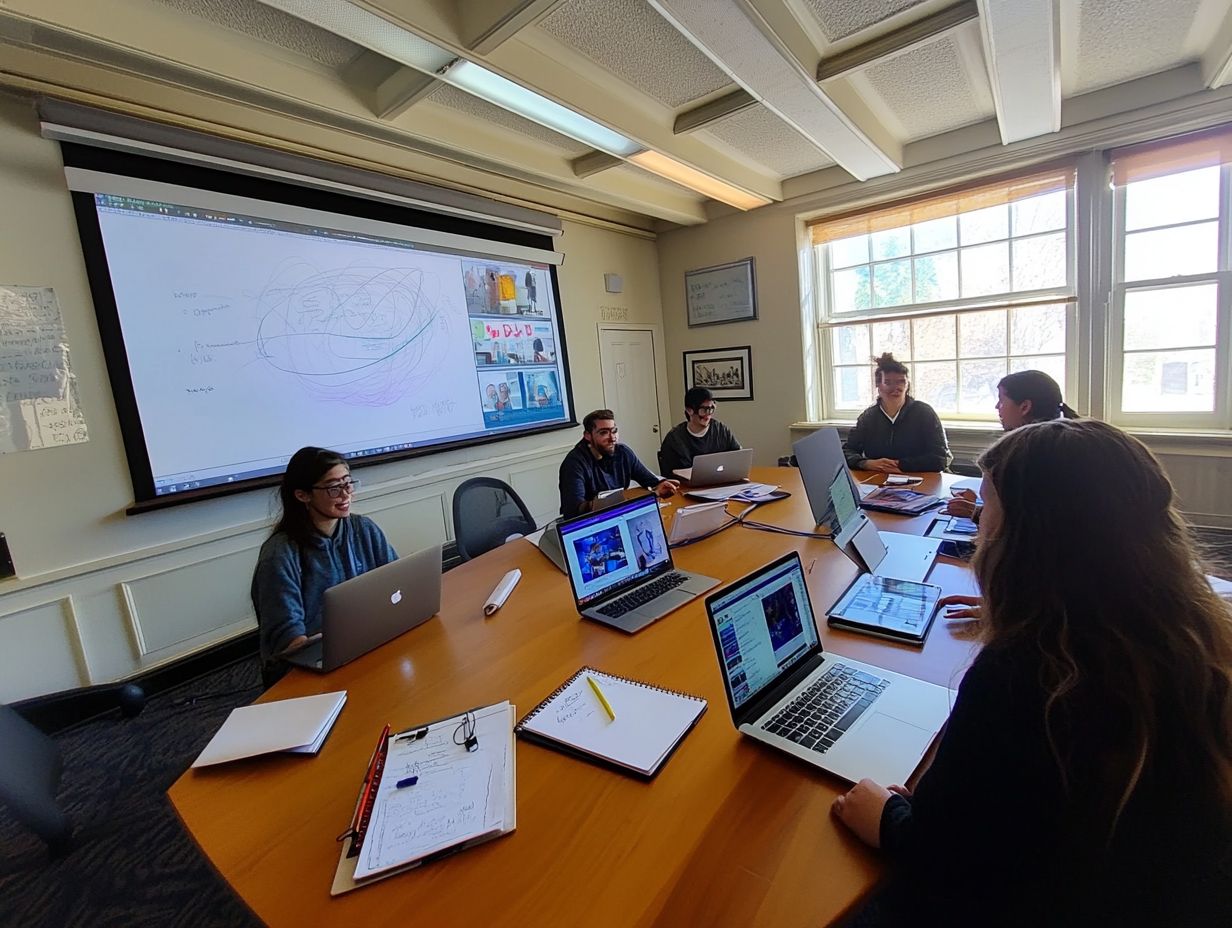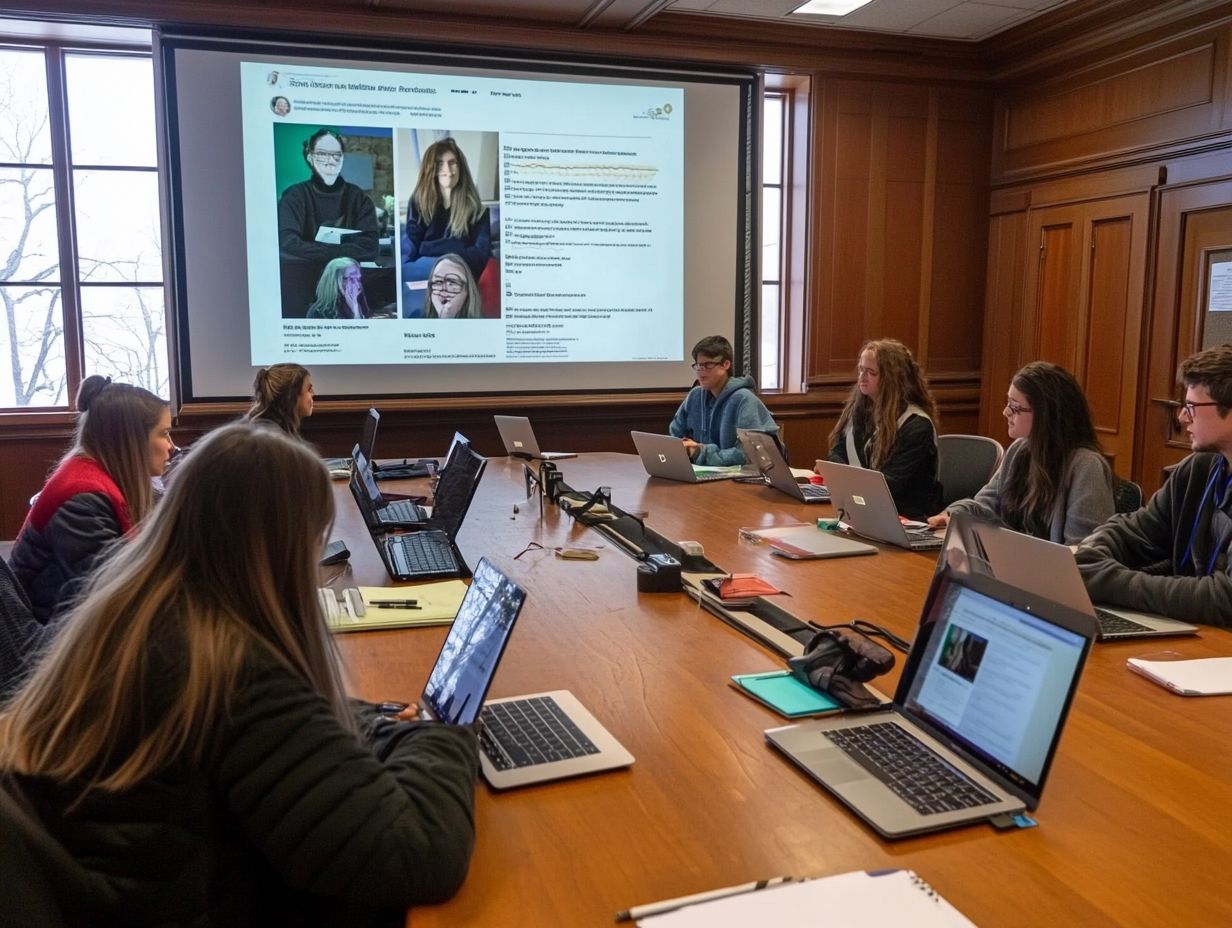The Role of Capstone Projects in Online Master’s
Capstone projects play a vital role in shaping the educational journey of students enrolled in online master’s programs. These comprehensive assignments provide a unique opportunity for you to apply your knowledge and skills to real-world scenarios while honing your critical thinking and problem-solving abilities.
This article will define capstone projects and discuss their significance in online education, the various types available, tips for selecting an appropriate topic, and effective strategies for successful completion. Discover how capstone projects can transform your academic journey!
Contents
Key Takeaways:
Here are some key insights about capstone projects:

Capstone projects in online master’s programs help students apply their knowledge and skills in a real-world context. There are two main types of capstone projects: research-based and practical application projects. To successfully complete a capstone project, students should consider their interests, skills, and effective time management and collaboration.
What Exactly is a Capstone Project?
A capstone project marks the high point of your academic journey, acting as a crucial link between theory and real-world application. Usually tackled in the final phases of your degree, this project allows you to highlight your research topic, problem-solving skills, and professional expertise.
At esteemed institutions like Southern New Hampshire University, you will engage in activities such as literature reviews and case studies while benefiting from mentorship by faculty members like Dr. Jeff Czarnec. This experience not only showcases your mastery of the subject but also encourages you to unleash your creativity within your chosen field.
The Importance of Capstone Projects in Online Master’s Programs
Capstone projects are essential in online master’s programs as they serve as a benchmark for your success and testament to your mastery of the skills and knowledge you’ve gained. They enable you to apply your knowledge and skills, showcasing your ability to tackle complex problems within your field.

This hands-on experience allows you to weave together the theoretical concepts you’ve learned and apply them to practical, real-world projects. You might engage in various project types, such as research studies, community service initiatives, or product development, each highlighting your understanding and reflecting your unique academic journey.
By incorporating insights from internships, part-time jobs, or volunteer experiences, you can enrich your projects with knowledge gained from professional settings. This combination of academic rigor and real-life experience equips you to face future challenges in your career while reinforcing the significance of your chosen field.
Real-World Relevance
Real-world relevance is a cornerstone of capstone projects, enabling you to address pressing community issues or significant business challenges with evidence-based conclusions. This connection sharpens your critical thinking and problem-solving skills while allowing you to apply theoretical knowledge in practical scenarios.
By incorporating case studies that reflect contemporary challenges, these projects bridge academia and industry. Engaging in tangible endeavors grants you invaluable insights into market demands and organizational dynamics, enhancing your learning journey and making you an appealing candidate to potential employers.
Types of Capstone Projects
Capstone projects can be categorized into two main types: research-based projects and practical application projects. Each serves a unique educational purpose within a master’s program, enriching your learning experience in different ways.
Research-Based Projects

Research-based projects require you to immerse yourself in a specific research topic, reviewing relevant articles and studies to bolster your graduate thesis.
This process entails gathering pertinent information and critically assessing various sources to determine their credibility and relevance.
By meticulously analyzing existing studies and theories, you establish a solid foundation for your arguments while deepening your understanding of the subject matter.
These endeavors are significant as they develop important skills that are very useful in both academic and professional realms.
The process sharpens your analytical abilities, enabling you to evaluate data and draw informed conclusions.
Ultimately, mastering knowledge through research fortifies your critical thinking, paving the way for innovative problem-solving techniques crucial in today s complex world.
Practical Application Projects
Practical application projects emphasize the integration of theoretical knowledge with real-world skills, allowing you to create tangible outputs such as video presentations or architectural models.
In these initiatives, effective project management is essential, offering a structured approach to planning, executing, and closing your endeavors successfully.
By using resources like the PMBOK Guide, a manual on project management best practices, you can deepen your understanding of essential project management methods, enabling you to tackle tasks systematically.
As you embark on these projects, consider compiling your work into an ePortfolio a dynamic tool that showcases your skills and achievements while reflecting your ability to apply project management principles in a practical context.
This dual focus on management and presentation enhances both your learning experience and your professional portfolio.
How to Choose a Capstone Project Topic
Choosing your capstone project topic is an exciting opportunity that can shape your future! It demands careful consideration of various factors.
You’ll want to reflect on your personal interests, address relevant community issues, and secure topic approval from your faculty.
Factors to Consider

When selecting a capstone project, consider your personal interests and how they align with the skills you’ve gained during your coursework.
It’s essential to assess the availability of resources that can support your project, such as access to industry experts, research materials, and cutting-edge technological tools.
A well-defined scope can significantly enhance your focus, ensuring the project remains manageable and on track.
Consider how your capstone can impact your future career opportunities. Projects that tackle current industry challenges or showcase innovative solutions can greatly enhance your portfolio, making you more appealing to potential employers.
Tips for Successfully Completing a Capstone Project
Successfully completing your capstone project relies on your ability to manage time effectively and cultivate strong collaboration and communication skills. These elements are crucial in demonstrating your professional competencies and setting yourself apart in any field.
Effective Time Management
Mastering time management is crucial to finish your capstone project on time and balance your other commitments effectively!
By thoughtfully crafting a project schedule, you can break down your workload into manageable pieces, helping you stay organized amid a sea of tasks.
Setting clear milestones not only gives you a roadmap for reaching specific goals but also serves as motivational checkpoints that propel you forward.
Prioritizing tasks is equally important, enabling you to tackle the most critical elements first.
These strategies work together to streamline your project process, reduce stress, and ultimately enhance the quality of your work, contributing significantly to your overall success as a student.
Collaboration and Communication
Collaboration and communication are key to a successful capstone project. They build a vibrant network among you, your peers, and your faculty.
When you and your teammates unite and share your diverse ideas and perspectives, you create a dynamic environment that elevates problem-solving and sparks innovation. Effective team dynamics yield better outcomes and create a welcoming environment where everyone feels valued and heard.
Soliciting feedback throughout your project lifecycle is crucial. It fosters a culture of continuous improvement and helps you identify potential pitfalls before they become obstacles.
Using tools like collaborative software, project management platforms, and regular check-in meetings can greatly improve team communication. This makes it easier to track progress and align goals among all participants.
Watch this video for insights on successful capstone projects:
Frequently Asked Questions
What is the purpose of a capstone project in an online master’s program?
The purpose of a capstone project in an online master’s program is to provide students with an opportunity to apply the knowledge and skills they have gained in a real-world context. It allows students to demonstrate their understanding and mastery of their chosen field of study.
How does a capstone project differ from a thesis or dissertation?
A capstone project differs from a thesis or dissertation in that it is typically more practical and hands-on, rather than solely research-based. While it may involve elements of research, the main focus is on applying knowledge and skills to solve a real-world problem.
What are the benefits of completing a capstone project in an online master’s program?
Completing a capstone project in an online master’s program offers several benefits. It provides the opportunity to apply theoretical concepts to practical situations, enhances critical thinking and problem-solving skills, and builds a professional portfolio. Additionally, it allows students to collaborate with industry professionals, gaining valuable experience and networking opportunities.
How does a capstone project prepare students for their future careers?
A capstone project helps prepare students for their future careers by providing hands-on experience in their field of study. It allows students to showcase their skills to potential employers and develop a professional portfolio. Moreover, it may involve partnerships with industry professionals, offering networking opportunities within their field.
What types of capstone projects are common in online master’s programs?
Students may complete a variety of capstone projects in online master’s programs. Common examples include case studies, research projects, consulting projects, and creative projects such as developing a product or designing a campaign. The type of project often varies based on the specific program and the student’s chosen field of study.
Are capstone projects required for all online master’s programs?
No, capstone projects are not required for all online master’s programs. Some programs may offer a thesis or comprehensive exam option instead. It is important to check with the specific program to determine if a capstone project is required for graduation.
Embrace this opportunity to shine in your field and connect with others!






